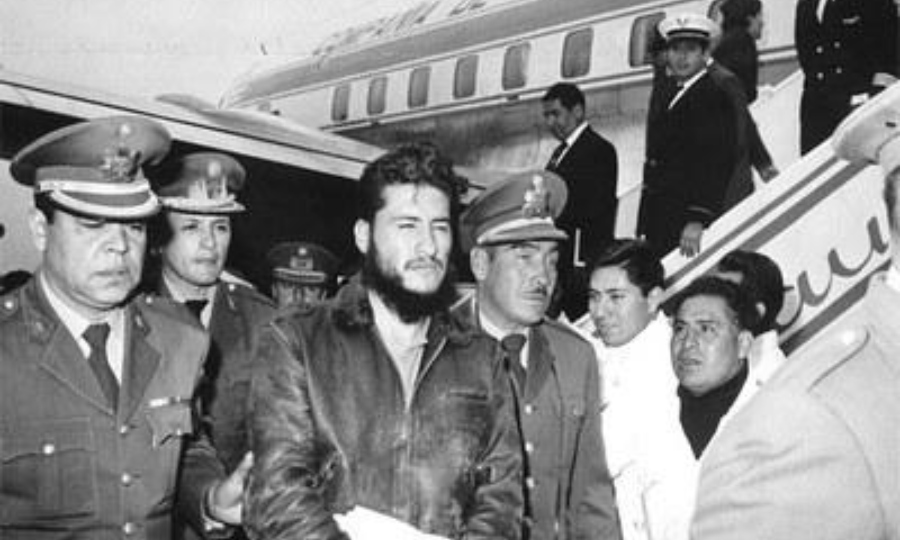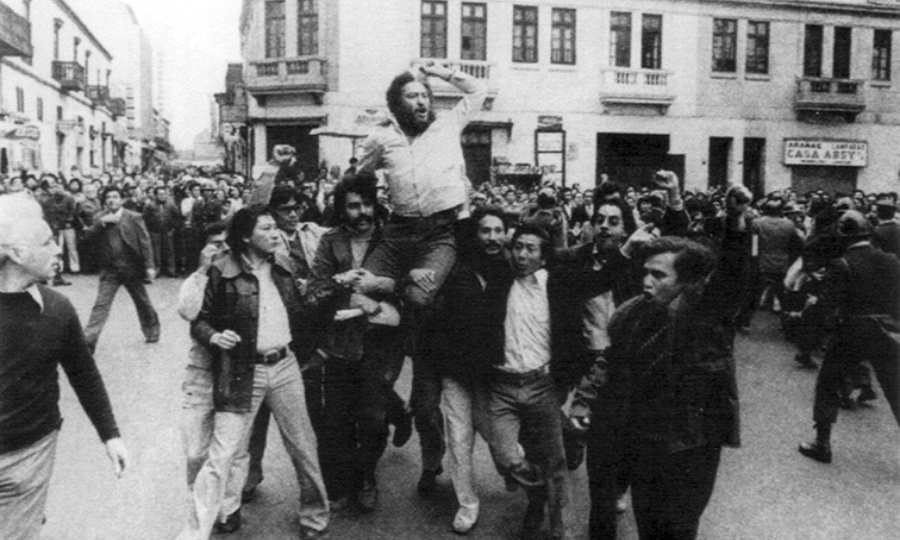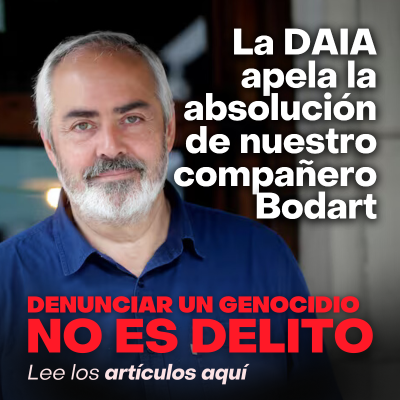Por Carlos Maradona y Guillermo Pacagnini
El domingo 25 de junio falleció el compañero Hugo Blanco, uno de los más importantes dirigentes trotskistas del movimiento de masas latinoamericano. Nacido a la vida política de la mano de nuestra corriente histórica y Nahuel Moreno, fue protagonista del alzamiento campesino del Cuzco, una de las experiencias revolucionarias más importantes del continente, parte del ascenso abierto con la Revolución Cubana y también uno de los laboratorios donde se desarrolló la primera gran polémica sobre estrategia en el movimiento trotskista: la construcción de partido o el foco guerrillero. Reivindicamos su trayectoria de lucha, de impulsar la movilización permanente, su pasión por la organización obrera, campesina y popular y su moral revolucionaria tanto en su intervención en los procesos de masas como en las tareas parlamentarias.
Sus comienzos
Hugo Blanco Galdós, nacido en el Cuzco, Perù, en el año 1934, era hijo de un padre abogado, defensor de campesinos en esa zona del Perú. Desde chico aprendió el idioma quechua y empezó su relacionamiento con dirigentes campesinos.
Muy joven, a sus 20 años, cuando en Perú había una dictadura, viajó a la Argentina con el objetivo de estudiar Agronomía en la Universidad de La Plata. Fue en esa ciudad donde conoció a la organización Palabra Obrera, orientada por Nahuel Moreno. En nuestro país había muchos jóvenes exiliados peruanos, entre ellos el hermano de Hugo Blanco. Muchos de esos exiliados habían sido militantes de APRA (1) en Perú. Hugo Blanco habìa conocido al trotskismo a través del Partido Obrero Revolucionario en Perú y en la Argentina intentó conectarse con organizaciones trotskistas. Así conoció a Palabra Obrera que tenía una fuerte implantación en sectores de trabajadores y estudiantes en la ciudad de La Plata. Hugo Blanco y otros compañeros peruanos, dejaron la universidad y se fueron a trabajar en fábricas de la zona. Hugo Blanco lo hizo en el frigorífico Swift de Berisso. Cuando en Perú cayó la dictadura y vino una apertura, él y otros compañeros regresaron, ya con la idea de fortalecer la construcción del partido revolucionario en Perú. Por ello se integra al POR peruano.
En el Perú, ingresar a trabajar en una fábrica era mucho más difícil que en la Argentina, pese a lo cual Hugo Blanco logra hacerlo en una aceitera pequeña y que no tenía sindicato. En ese momento llega a Perú quien era vicepresidente de EEUU, Richard Nixon, y se prepara una gran manifestación repudiando su visita. En esa marcha participa activamente el POR y se desata una feroz represión. Detienen a compañeros y empieza un proceso de búsqueda de otros entre ellos Hugo Blanco. Ahí en el partido se resuelve que viaje a Cuzco donde se estaba desarrollando un levantamiento campesino muy importante.
El levantamiento de La Convención y el rol de Hugo Blanco
Cuando llega al Cuzco, Hugo trabaja como canillita (vendedor de diarios) y funda un sindicato. Se empieza a relacionar con los campesinos de la provincia de La Convención. Lo encarcelan por participar en una movilización y con una fuerte presión de la Federaciòn de Trabajadores de La Convenciòn se logra su libertad. Se muda a la zona del valle de La Convenciòn y allí comienza a impulsar la organización campesina, con la experiencia en organización que había adquirido en Argentina. En el año 1961 estalla un gran levantamiento agrario que tiene su epicentro en la provincia de La Convención y en Lares. Allí Hugo Blanco se va convirtiendo en un importante dirigente campesino, ayuda a incorporar al partido a otros dirigentes y se produce un gran fortalecimiento del POR. El grito de ¡Ota allpa otac huañuy! (Tierra o muerte) se transforma en el grito de guerra de decenas de miles de campesinos. Con el trabajo realizado por Hugo Blanco y sus compañeros en el Cuzco se pasa de 6 sindicatos organizados a 148. En junio del año 1961 Hugo Blanco se transforma en uno de los más importantes dirigentes campesinos del Cuzco y comienza una disputa con el Partido Comunista peruano por la conducción de la Federaciòn de Trabajadores del Cuzco.
Durante todo el año se desarrolla un proceso de sindicalización, de ocupación de haciendas y con enfrentamientos armados con la policía. La corriente internacional que impulsaba Nahuel Moreno, el SLATO (Secretariado Latinoamericano del Trotskismo Ortodoxo) impulsa con toda su fuerza la lucha contra el latifundio y jerarquiza en su programa la defensa de los indígenas como nación oprimida. La insurrección armada avanzó en el Cuzco pero no logró extenderse a todo el territorio de Perú. Desde Argentina, Palabra Obrera lanzó una campaña internacional de apoyo, se envió un compañero de la dirección a Cuba a pedirle al gobierno de Fidel Castro que apoyara ese levantamiento y ayuda material, pero esa ayuda nunca llegó. La insurrección campesina fue quedando aislada y comenzó una fuerte represión contra sus dirigentes, en particular contra Hugo Blanco.

En agosto de 1962, la protección de los campesinos había logrado que Hugo Blanco no sea capturado, pero se vio obligado a armar un destacamento guerrillero para esconderse en las montañas y poder sobrevivir. Finalmente el 15 de mayo de 1963 Hugo Blanco es detenido y condenado a pena de muerte. Una gran campaña internacional impulsada por el SLATO logra que la pena de muerte sea anulada y se lo condena a 25 años de prisión. Ocho años después de ser detenido, se declara una amnistía y es deportado primero a Mèxico y de allì viaja a Argentina. Mientras estuvo detenido siguió siendo un símbolo de lucha y organización para los campesinos del Cuzco, que organizaron con antorchas, un gran cartel que decía “Libertad a Hugo Blanco” en la ladera de uno de los cerros. Este proceso dio lugar a un debate muy importante en el partido peruano y el movimiento trotskista sobre la política para unir la lucha campesina con la clase obrera urbana y, sobre todo, la estrategia de construir partido en contraste con el guerrillerismo. Así como el impulso de la revolución cubana motorizó grandes procesos de movilización, la política del foco guerrillero abortó y fue nefasta para esos procesos. Así sucedió a la luz del proceso peruano, donde lamentablemente no se llevó adelante la orientación del SLATO que planteaba no solo desarrollar la lucha campesina levantando sus reclamos como parte del programa de transición, sino unir la revolución agraria con las masas urbanas y llamar a construir el partido revolucionario. Primó la política foquista y de abandono de la estrategia de construir partido. Política adoptada por el mandelismo que luego llevó a la división de la IV Internacional. Hugo Blanco, aunque luego abandonaría las filas de la corriente de Moreno, reconocería la corrección de sus planteos. (3).
La experiencia del FOCEP y la vinculación al movimiento indìgena
A fines de la década del 70, Hugo Blanco regresa a Perú después de estar muchos años exiliado. En el año 1978 se desarrolla un gran movimiento de obreros y campesinos, impulsado también por el trotskismo, que da origen a la formación del FOCEP (Frente Obrero Campesino Estudiantil y Popular). En las elecciones a la Asamblea Constituyente de 1978, el FOCEP sacó el 12% de los votos y Hugo Blanco fue uno de los candidatos más votados.
El FOCEP logró una fuerte implantación y desarrollo, pero al no avanzar en la construcción del partido revolucionario se fue perdiendo una extraordinaria oportunidad de empalmar con la bronca creciente entre trabajadores y campesinos y esta experiencia se frustró.
En el año 1980 asumió como diputado y en 1990 fue elegido senador, desde el Congreso nacional volvió a ser el portavoz de las luchas y los reclamos de los trabajadores, campesinos y sectores populares del Perú. Este mandato se vio interrumpido en el año 1992 por el autogolpe de Fujimori.
Hugo Blanco nunca abandonó la lucha ni sacó provecho alguno de sus logros para intereses personales, si bien se fue alejando del trotskismo y vinculando con el movimiento indigenista, siempre defendió los intereses de los pueblos. Dirigió por muchos años la revista La lucha indígena y continuó la batalla contra el imperialismo y el capitalismo, defendiendo con todas sus fuerzas los intereses de los explotados y oprimidos y la democracia de las bases y las asambleas para decidir todo en el movimiento indígena y campesino.

Una vida al servicio de las luchas
Como podemos ver, toda la vida de Hugo Blanco estuvo recorrida por la lucha, la movilización, la defensa de las causas campesinas, obreras y populares y la batalla por la organización sindical y política del pueblo. Más allá de su alejamiento primero de nuestra corriente adhiriendo al revisionismo mandelista y luego del trotskismo, su vida militante expresó décadas de lucha y organización que todos los revolucionarios del mundo debemos reivindicar.
En el año 2003 Hugo Blanco sufrió un accidente cerebrovascular del que pudo recuperarse, aunque le dejó secuelas en su organismo. El domingo 25 de junio, a los 89 años de edad, falleció en Suecia, donde habían logrado trasladarlo sus hijos para un tratamiento médico de alta complejidad y muy costoso, para el cual pidieron apoyo solidario. Esta vez la enfermedad le ganó y se llevó a un extraordinario dirigente campesino y popular, a un eterno defensor de los derechos de los explotados y oprimidos y a un constructor de organización revolucionaria para luchar por los derechos de los de abajo.
Desde el MST – Liga Internacional Socialista despedimos con enorme tristeza al compañero Hugo Blanco. Pero esa tristeza no empaña la reivindicación de una vida puesta al servicio de las luchas y por eso Hugo Blanco estará siempre en las lucha y la organización de los pueblos del mundo, en esta batalla tan desigual pero tan necesaria contra el capitalismo, contra el imperialismo y contra todos los que quieren avanzar contra los pueblos.
Hasta siempre camarada Hugo Blanco, hasta el socialismo.
- APRA: Alianza Popular Revolucionaria Peruana o Partido Aprista, partido tradicional peruano originalmente nacido como un movimiento nacionalista burgués.
- Tierra o Muerte. Las luchas campesinas en Perú. Escritos de Hugo Blanco donde relata su experiencia con el levantamiento campesino del Cuzco.
- Perú: dos estrategias. Textos de Nahuel Moreno e intercambio de cartas con Hugo Blanco y otros dirigentes del POR.





